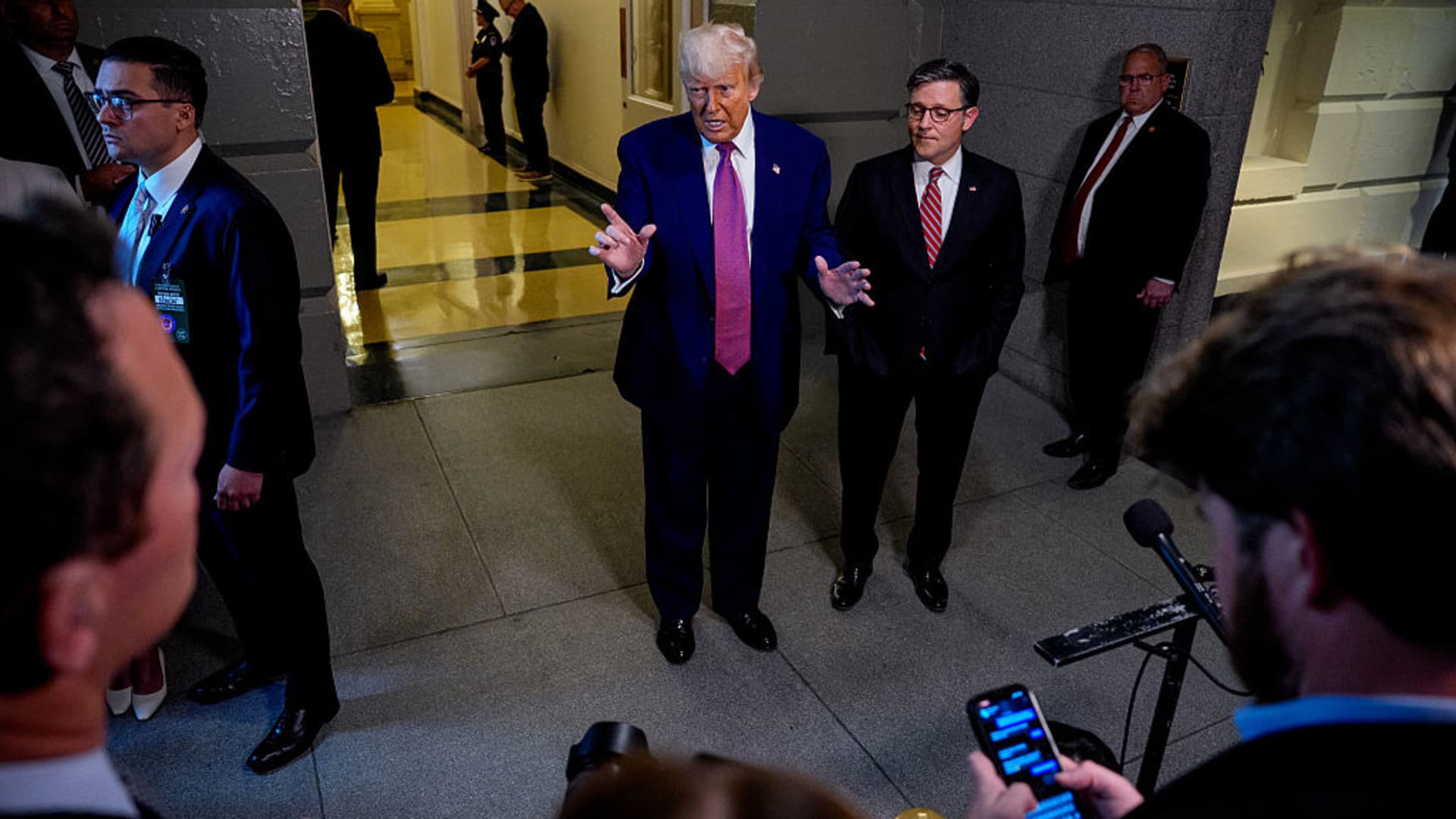U.S. President Donald Trump, accompanied by Speaker of the House Mike Johnson, speaking to the media as he departs a House Republican meeting at the U.S. Capitol on May 20, 2025, in Washington, D.C.
Andrew Harnik | Getty Images News | Getty Images
It’s one bad headline after another coming from the White House these days. Just as the tariff-related turmoil rocking markets subsided — and only temporarily, since the clock is still ticking on the pause on “reciprocal tariffs” — fears of ballooning U.S. debt are sparking another broad sell-off in markets. This time, investors are wary because President Donald Trump’s tax bill is projected to add $3 trillion to $5 trillion to the U.S. debt, reported Reuters, citing nonpartisan analysts.
A fiscally challenged U.S. means investors will demand higher returns to hold the country’s debt. Indeed, Treasury yields jumped Wednesday. The 30-year Treasury bond yield crossed the 5% level for the second time this week and the 10-year traded at 4.61%, the highest since February. While rising yields mean bond prices drop, they also promise higher returns at potentially lower risks, dulling the allure of stocks.
Under pressure from spiking Treasury yields — which mean elevated borrowing costs for companies and consumers — U.S. markets sold off Wednesday, a sharp reversal from the rally beginning May 12 which gave the S&P 500 a six-day win streak. Unlike tariffs, which Trump seems to be able to conjure or dismiss unilaterally at a wave of his hand, a tax bill needs to pass through the different layers of the government and be agreed on by fractious politicians. It’s hard to imagine a “Trump put” happening here.
What you need to know today
Sell-off in U.S. markets
U.S. markets tumbled Wednesday on worries over the country’s deteriorating fiscal health. The S&P 500 lost 1.61%, the Dow Jones Industrial Average fell 1.91% and the Nasdaq Composite gave up 1.41%. Treasury yields spiked, with the 30-year yield hitting 5.085%, the highest since October 2023, while the 10-year yield traded at 4.607%, a level not seen since February.
Threat of U.S. debt widening
The U.S. debt-and-deficit situation is bad and facing real prospects of getting worse, triggering a high-profile credit rating downgrade from Moody’s and another selling stampede in stocks and bonds, writes CNBC’s Jeff Cox. If U.S. President Donald Trump’s “big, beautiful” spending bill passes, there are concerns the U.S. deficit could widen even more and keep Treasury yields high.
Bitcoin surpasses previous high
Bitcoin prices popped 3.2% during Asia trading hours to hit a new high of $111,416, according to Coin Metrics, breaking its January record. Elsewhere in markets, Asia-Pacific markets fell Thursday. Hong Kong’s Hang Seng Tech index, which comprises the 30 largest Hong Kong-listed technology companies, declined around 1.4%. That’s despite shares of Chinese electric vehicle maker Xpeng surging roughly 6.6% Thursday following upbeat earnings and stronger-than-expected guidance for the second quarter, which prompted analysts to grow more optimistic on its stock.
OpenAI snaps up Jony Ive’s startup
OpenAI said in a blog post Wednesday that it’s buying former Apple Chief Design Officer Jony Ive’s artificial intelligence devices startup io for about $6.4 billion in an all-equity deal. OpenAI said it’s paying $5 billion in the transaction, as it already owns 23% of the company. The deal brings OpenAI into the world of hardware, and underscores the growing sense in Silicon Valley that smart AI assistants could upend the gadget world.
U.S. chip export controls a ‘failure’: Nvidia CEO
Nvidia CEO Jensen Huang on Wednesday said at an AI trade show in Taiwan that U.S. chip export controls are a “failure” and warned that the restrictions are doing more damage to American business than to China. Huang added that the policies have cut the AI chip leader’s China market share from 95% to 50% and motivated Beijing to make its own chips faster.
[PRO] Boeing can deliver: Etihad
Abu Dhabi’s Etihad Airways says it can navigate the turbulence surrounding Boeing‘s delivery delays, even as it doubles down on a major wide-body order and a multibillion-dollar fleet overhaul. Here’s why the gulf carrier is confident in working with the embattled American aircraft manufacturer.
And finally…
Traffic outside the Central Bank of Brazil headquarters in Brasilia, Brazil, on Monday, June 17, 2024.
Bloomberg | Bloomberg | Getty Images
Emerging markets said to see the next bull run as the ‘sell U.S.’ narrative gains ground
Emerging markets stocks are in the spotlight again as the “sell U.S.” narrative gained fresh momentum, following Moody’s recent downgrade of the U.S. credit rating.
“Weaker U.S. dollar, U.S. bond yield top, China economic recovery … nothing will work better than emerging market stocks,” Bank of America’s team, led by investment strategist Michael Hartnett, said in a note.
Similarly, JPMorgan upgraded emerging market equities from neutral to overweight on Monday, citing thawing U.S.-China trade tensions and attractive valuations.
Erosion of confidence in U.S. assets, with a sell-off in U.S. Treasurys, equities and greenback, has fueled the bullishness for emerging markets.





